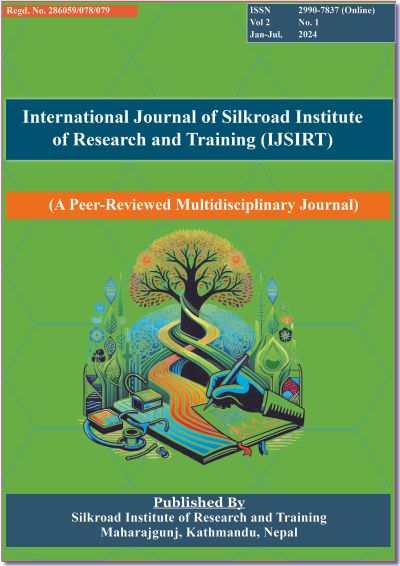Application of the Milan System for Reporting Salivary Gland Cytopathology with Histopathological Correlation
DOI:
https://doi.org/10.3126/ijsirt.v1i2.68456Abstract
Background: Fine-needle aspiration (FNA) is widely accepted as an efficient first line diagnostic of salivary gland lesions.
Intratumoral heterogeneity and morphological overlap existing between salivary gland tumors makes it rigorous and
challenging in the diagnosis by FNA. The Milan System for Reporting Salivary Gland Cytopathology (TMSRSGC) is a tiered
risk-stratification scheme designed to standardize reporting and facilitate decision making. The objective of this study is to
evaluate the efficacy of The Milan system for reporting salivary gland cytopathology with histopathological correlation.
Method: A prospective study of salivary gland cytology was performed over a 1-year period at Department of Pathology
BPKIHS. Cases were categorized as per the MSRSGC and histopathological correlation was obtained. The risk of
malignancy were calculated for all diagnostic categories.
Result: A total of 30 salivary gland cytology with histopathological follow up were evaluated. FNA had a sensitivity,
specificity, diagnostic accuracy, PPV and NPV of 72.7%, 100%, 88.88%, 100% and 84.2% respectively. Good agreement
was seen between cytological and histopathological diagnosis.
Conclusion: The Milan System for Reporting Salivary Gland Cytopathology provides an effective standardized
diagnostic framework which aids in better clinicopathological communication and improves the quality, clarity as well as
reproducibility of cytological diagnosis of salivary gland lesions.
Downloads
Downloads
Published
How to Cite
Issue
Section
License
Copyright (c) 2024 Alina Baral, Anju Pradhan, Paricha Upadhyaya, Ashish Paudel

This work is licensed under a Creative Commons Attribution-ShareAlike 4.0 International License.
CC BY-SA: This license allows reusers to distribute, remix, adapt, and build upon the material in any medium or format, so long as attribution is given to the creator. The license allows for commercial use. If you remix, adapt, or build upon the material, you must license the modified material under identical terms.




